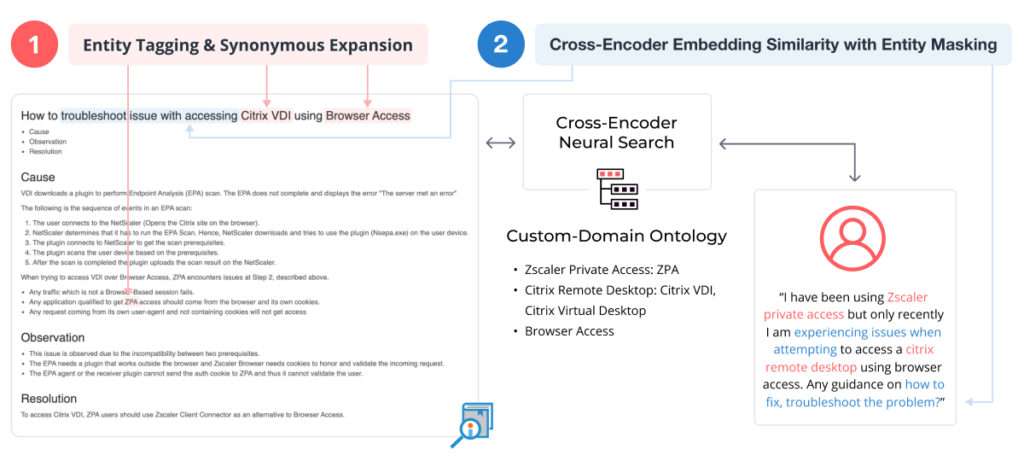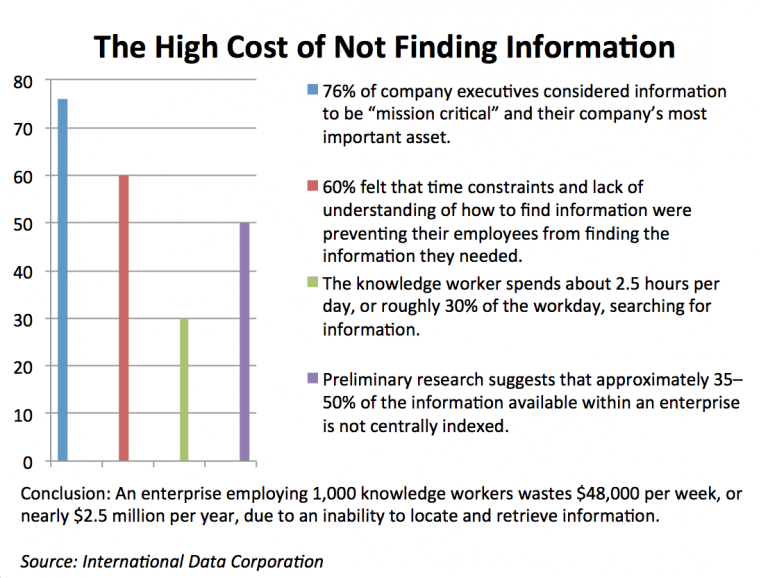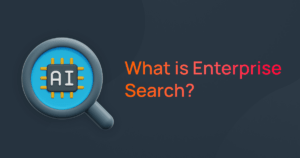Enterprise search significantly improves the ability of employees within an organization to efficiently locate information across diverse data sources. By facilitating the indexing, searching, and displaying of pertinent content for authorized users, it effectively manages both structured data, such as databases, and unstructured data, like documents and emails.
Importantly, enterprise search systems can process complex queries, offering dynamic responses and summaries by aggregating information from various repositories instantly.
These systems employ advanced techniques such as Retrieval Augmented Generation (RAG) to intelligently synthesize information from multiple sources, ensuring that responses are both comprehensive and contextually relevant in real time.
Enterprise search allows for seamless access to crucial information that can help organizations make informed decisions, improve user productivity and collaboration, and gain a competitive advantage in their industry.
How Does Enterprise Search Work?
Enterprise search works by crawling and indexing vast amounts of information from multiple data sources, such as databases, file systems, and cloud storage solutions. Once the information is indexed, the search engine enables users to conduct searches using keywords, natural language queries, or advanced filters. The three primary phases for enterprise search engines to facilitate information dissemination are:
Discovery
Search engines crawl all data from multiple sources, collecting information from throughout the organization across internal and external data sources.
Indexing
After the data has been retrieved, the enterprise search engine normalizes, analyzes, and enriches the data by parsing relationships inside that data. This AI-Powered Workplace Search tool then stores the results so that users can retrieve them quickly and with confidence in their accuracy.
Search Journey
On the front end, an employee’s request for information may consist of a combination of structured or unstructured query strings. The enterprise search tool offers results that appear to be the most relevant to the query string, taking into account the employee’s profile and work context. Different people may get varying results that relate to their specific location, role, work, and search histories.
The search results are then ranked based on their relevance to the query, providing users with the most pertinent information first. A great enterprise search tool can understand the user’s context, search history, and preferences, enabling it to provide results with search personalization.
Key Features of Enterprise Search Tools
Enterprise search tools come with a range of features that enhance the quality of search results, user experience, knowledge management capabilities, and security. Some of the main features include:
| Feature | Description |
| Advanced Search | Ability to filter results by data type, date range, language, or author. |
| Faceted Navigation | Organizes search results into categories, making it easier for users to refine their search. |
Organizations that implement enterprise search solutions can significantly improve their internal information retrieval processes, enhance productivity, and customer relationship management and drive innovation.

Components of Enterprise Search Systems
Implementing enterprise search in an organization requires a comprehensive strategy that includes various components. These components work together to ensure that the search engine runs smoothly and effectively, providing users with fast and accurate search results.
| Component | Description |
| Indexing | This component creates an index of all the data sources within an organization. It involves analyzing and categorizing the data into searchable terms. |
| Crawling | This component involves scanning all the data sources for any changes or updates, ensuring that the index is up-to-date. |
| Query Processing | This component receives search queries from users and translates them into a language the system can understand. It then retrieves relevant search results and presents them to the user. |
| Relevance Ranking | This component uses algorithms to rank search results based on relevance to the user’s query. It considers factors such as the frequency of keywords, the recency of documents, and user behavior patterns. |
| User Interface | This component provides a user-friendly interface for users to interact with the system. It includes search boxes, filters, and other tools to refine search results. |
Each of these components is critical to the success of an Enterprise search system. The indexing and crawling components ensure that the system has the most up-to-date information available.
The query processing and relevance ranking components provide users with accurate, relevant search results. Finally, the user interface component enables users to interact with the system intuitively and efficiently.

Different Types of Enterprise Search
Enterprise search has evolved beyond traditional keyword-focused web searches to incorporate more advanced technologies to improve the accuracy and relevancy of search results. There are different types of enterprise search systems that organizations can choose from to align with their specific needs.
Traditional Keyword-based Search
Traditional keyword-based search is the simplest form of search. It uses keyword queries to retrieve matching documents or content. This type of intranet search is useful when the user intent is searching for a specific document or when a user knows the exact keywords to use to find the information they need in their content management systems.
However, keyword-based search has limitations, and organizations need to consider other types of enterprise search systems like enhancing enterprise search by generative AI to cater to their requirements.
Faceted Search
Faceted search, also known as guided navigation, is a more advanced form of search that employs filters to refine search results. This type of search presents users with a set of filters they can use to narrow down their search results based on specific attributes such as author, date, location, and content type.
Faceted search provides a more intuitive and personalized search experience, enabling the tool to better understand user intent to quickly locate the information they need.
Benefits of Enterprise Search
Implementing enterprise search systems is crucial for organizations, with components like indexing, crawling, and user interfaces ensuring up-to-date, relevant results. As organizations grow, content becomes fragmented across various platforms like CMS, CRM, and ERP.
Large enterprises often use many SaaS applications, emphasizing the need for a unified search system. Simple solutions suffice for smaller entities, but larger organizations can benefit from advanced features like ML, NLP, and NLU, offering accurate search results and cost-effective benefits.
Implementing an effective enterprise search solution can offer a multitude of benefits to organizations seeking to streamline their information retrieval processes. Here are some of the key advantages:
- Improved productivity: By enabling faster and more accurate search results, users can save time and focus on high-priority tasks.
- Better collaboration: Employees can easily find relevant information to share with colleagues, encouraging knowledge-sharing and cross-functional teamwork.
- Enhanced decision-making: With access to more comprehensive data sets and insights, organizations can make more informed decisions.
- Improved customer experience: By quickly finding relevant information, customer service staff can provide more personalized and efficient interactions with clients.
Overall, implementing an enterprise search solution can result in significant improvements in workflow efficiency, data accuracy, and decision-making capabilities, ultimately helping organizations achieve their goals more effectively.
Role of AI Search in Enterprises
Artificial Intelligence (AI) techniques have revolutionized the way we approach data analysis and retrieval. With the advent of Search as a Service, organizations have access to scalable and customizable search solutions that harness the power of AI to provide more accurate and relevant search results.
This model employs cloud computing and advanced AI techniques, including machine learning and natural language processing, to offer personalized and efficient search capabilities across various data sources. Search as a Service stands as a testament to the transformative potential of AI in enterprise search, offering a flexible and powerful approach to information retrieval in the digital age.
An AI-powered enterprise search solution uses advanced algorithms and techniques such as machine learning, natural language processing, and neural search to improve search accuracy and relevancy. These algorithms enable the system to understand the context and intent of the user’s query, providing personalized and accurate results.
Machine learning algorithms can analyze and learn from past user interactions with the system, identifying patterns and preferences in search behavior. Using this information, the system can provide tailored results by anticipating the user’s intent and delivering relevant information more promptly.
Natural language processing (NLP) algorithms enable the system to understand the meaning behind the words used in a search query. This allows it to identify synonyms, acronyms, and common misspellings, improving the accuracy and relevancy of the results.
Enhancing with Neural Search Technologies
In recent years, the emergence of neural search has brought about a paradigm shift in the field of enterprise search technology. Neural search algorithms leverage Artificial Intelligence (AI) techniques, such as deep learning and natural language processing (NLP), to analyze and understand the context of search queries and provide more relevant and accurate search results.
Unlike traditional keyword-based search engines, neural search takes into account the meaning and intent behind the search query, rather than just matching keywords. This enables it to understand the nuances of human language and provide more personalized and contextually relevant results.
Applications of Neural Search in Enterprise Search
Neural search has various applications in enterprise search, including:
- Improved search relevancy: Provide more accurate and relevant results, enhancing the overall search experience.
- Semantic understanding: Analyze the meaning and context of search queries to understand the intent behind them and provide more appropriate results.
- Contextual analysis: Analyze the user’s past conversations, search history, behavior, and preferences to provide a more tailored response.
These applications make neural search an ideal solution for organizations with large datasets and complex search requirements. For example, e-commerce websites can use neural search to provide more personalized product recommendations based on user behavior.
AI-Powered Enterprise Search: Enhancing Efficiency and Insight
In the modern data-driven environment, where data complexity and volume expand relentlessly, organizations are turning to AI-powered enterprise search platforms. These platforms are equipped with state-of-the-art technologies to effectively navigate and retrieve critical information across varied enterprise data landscapes.
Leveraging AI algorithms, including machine learning and natural language processing, these platforms automate and refine the search process. They ensure the accuracy and relevance of results through advanced semantic understanding and contextual analysis, delivering personalized search experiences.
Key Features and Their Benefits Include:
- Built-in Query Processing and Relevance Ranking: Utilizes advanced algorithms for interpreting queries and ranking results, directly enhancing productivity by minimizing information retrieval times.
- Smart Data Classification and Extraction: Employs AI to classify and extract relevant data from both structured and unstructured sources, boosting collaboration through timely access to crucial information.
- Integrated Analytics and Reporting: Offers insights into search trends and user behavior, fostering better decision-making with actionable intelligence.
AI-powered enterprise search platforms are not just tools but comprehensive solutions that adapt to an organization’s specific requirements. They feature a user-friendly interface for ease of use and integrate smoothly with existing systems, ensuring that they augment rather than disrupt the current workflows. This harmonious integration aids organizations in navigating the vast seas of their data efficiently, making informed decisions, and enhancing overall productivity and collaboration.
Implementing Enterprise AI Search
If your organization has decided to implement an enterprise AI search tool, there are several considerations to keep in mind to get optimal performance and ensure a successful implementation.
Data security
Data security is a critical factor to consider when implementing an intelligent search solution. Make sure that the solution has adequate security measures in place to protect sensitive data such as employee records, financial information, and confidential documents. It is also important to ensure the solution complies with relevant industry standards and regulations such as GDPR, HIPAA, and PCI-DSS.
Scalability and Customization
Choose a solution that can scale with your organization’s growing needs. The solution should be customizable to meet your specific business requirements and be able to integrate with existing systems such as CRM, ERP, and CMS. Consider whether the solution can be easily configured and maintained by your IT team or if external support is required.
Integration with Existing Systems
An intelligent search solution should seamlessly integrate with existing systems such as ServiceNow, Zendesk, Atlassian Jira, Salesforce, SharePoint, and Oracle to access data and ensure that the search results are comprehensive and relevant.
User Experience
One of the key factors in the success of an intelligent search solution is the user experience. The solution should be intuitive, easy to use, and provide relevant results quickly. The solution should also have a mobile-friendly interface and support multiple languages.
By considering these factors, your organization can successfully implement an intelligent search solution that enhances productivity, collaboration, and knowledge management.
Choosing the Best Enterprise Search Platform
Choosing the best enterprise search platform can be a daunting task, given the wide variety of options available in the market. However, it is essential to select the most suitable platform that aligns with your organization’s specific needs.
A few factors to consider when selecting an Enterprise Search tool include:
- Scalability: The platform should be able to handle the increasing volume of data as your organization grows.
- Flexibility: The platform should be highly customizable, allowing you to tailor the search experience to your users’ needs.
- Ease of use: The platform should have a user-friendly interface and be easy to navigate.
- Vendor Support: The vendor should provide adequate support and ensure smooth integration with existing systems.
Conclusion
Implementing an effective enterprise search solution can significantly enhance an organization’s productivity, collaboration, and decision-making processes. By leveraging the power of Aisera’s Enterprise AI Search solution, organizations can efficiently locate and retrieve relevant information from various data sources.
When choosing an enterprise search platform, it is essential to consider factors such as scalability, flexibility, ease of use, and vendor support. Organizations should also prioritize data security, scalability, customization, and integration with existing systems when implementing an intelligent search solution.
With the emergence of AI-powered enterprise search tools and solutions, organizations can now benefit from a unified search experience, actionable insights, and advanced search analytics.
In conclusion, organizations that embrace the potential of enterprise search solutions are poised to drive productivity, innovation, and success. It’s time to harness the power of your Enterprise search capabilities and unleash the full potential of your organization’s information resources! Book a custom AI demo to experience the power of AI.

